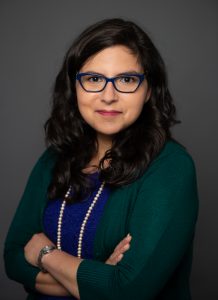
Jenny Tone-Pah-Hote, associate professor in the department of American studies in the College of Arts & Sciences, passed away the weekend of Aug. 8 from leukemia.
Tone-Pah-Hote was a respected indigenous scholar (Kiowa) whose courses reflect her interdisciplinary interests in American Indian cultural and political history. “The Kiowa in American Studies,” “Native America in the Twentieth Century” and “American Indian Art and Material Culture” explored political, social, historical and cultural facets of American Indians and were exceedingly popular courses. Her book, Crafting an Indigenous Nation: Kiowa Express Culture (UNC Press, 2019) examines her rich ancestral history and how the Kiowa nation have used their culture to “confront external pressures, express national identity and wrestle with changing gender roles and representations.”
She was also a highly respected mentor to Honors students, worked closely with First Nations Graduate Circle and The Center for the Study of the American South (CSAS), and led discussions about Native American art at the Ackland Museum and Nasher Museum of Art to make an indelible mark on the Carolina community and beyond.
The response to the news of her tragic passing was immediate and heartfelt. “I am deeply saddened to learn of the death of Jenny Tone-Pah-Hote,” said Terry Rhodes, dean of the College of Arts & Sciences. “My heart goes out to her husband, Keith Richotte, and their son, Steven. Her loss will be felt throughout the College of Arts & Sciences, but her memory will live on through her scholarly works that have contributed to our understanding of Kiowa culture and history.”
Earning a BA at the University of Missouri in 2001 and a PhD at the University of Minnesota in 2009, she was recruited to UNC by Sibby Anderson Thompkins, director of the Carolina Postdoctoral Program for Faculty Diversity (CPPFD), Special Advisor to the Provost and Chancellor for Equity & Inclusion and Interim Chief Diversity Officer. Tone-Pah-Hote arrived on campus with a wealth of knowledge, a thirst for more, and a passion for teaching.
Anderson recalled, “I first met Jenny when she entered CPPFD as a fellow in our 2009-2011 cohort. She was a little shy and quiet, but fun to spend time with. She was a great friend and advocate for the program, but foremost she was an amazing scholar who wasn’t seeking the spotlight. Her voice as an indigenous scholar was so powerful that it elevated and brought attention – rightly – to the contributions of Kiowa arts and cultural expressions.”
Annette Rodriguez, also an alumna of CPPFD, said of Tone-Pah-Hote, “She was so generous and encouraging, working in a writing group with members of our department and mentoring students. I appreciate the short time I had to learn from Jenny, and especially to laugh with her.”
Ben Frey, assistant professor, department of American studies, similarly noted, “Jenny was just such an amazing person. She had the kind of personality that would light up a room, though I sometimes got the sense that she sometimes wanted to hide under a table. She had a wonderfully sharp sense of humor and a kind of caring vulnerability that I have seldom seen matched. She possessed, as few people do, that intuitive quality of indigenous people for holding space for one another. She was a top-notch scholar, dedicated to her nation, her people, and her culture. I am proud that I was able to be her friend.”
Perhaps those who feel the loss most keenly are her students. The impact on them – particularly those who are Native and finally saw someone who looked like them leading a classroom and with shared insight into their history – was astounding. Jamison Lowery, the last student she mentored before her diagnosis, completed his Honors thesis this spring under her aegis. “Dr. Tone-Pah-Hote was very formative to my time at Carolina,” he said. “She was one of the earliest examples I had of a Native professional in the field of academia, a place of which I was very unfamiliar with. Not only was she my professor for multiple classes, but also a steadfast mentor for my research. She strived to serve the Native community in both small and great ways. I’m just thankful to have gotten to know her and I pray for her loved ones.”
Her husband Keith Richotte (also a professor in the department of American studies) suggested that people may want to purchase her book as a way to keep her scholarship alive and relevant and part of the public discourse, and to “honor the brilliant and inspiring woman that Jenny was.”
“Even if you have no interest in reading it (although you should) or already have a copy (and you should), please just buy it and donate it to a library or give it as a gift,” he said. “See that it gets into the hands of someone who might find it useful.”
Through this difficult time, Richotte has kept his focus on the family that he created with Jenny. “The other major accomplishment, besides her book, that Jenny gifted to the world is our son, Steven,” he said, as he contemplated the plans they had for their future. “She was going to be the perfect balance to what I could offer him: I was going to bring us to the hockey games and she was going to bring us to the museums and pow wows. Now that I don’t have my parental partner, I intend on doing all of the necessary extra work to make the best future I can for him.”
A trust fund for Steven is also being established. Details will be announced shortly on the department of American studies website.
By Adrianne Gibilisco, University Office for Diversity and Inclusion
